One episode after she put out a fire for a joke, Alara is so terrified of fire that a crewman dies due to her hesitation in the face of some fire.
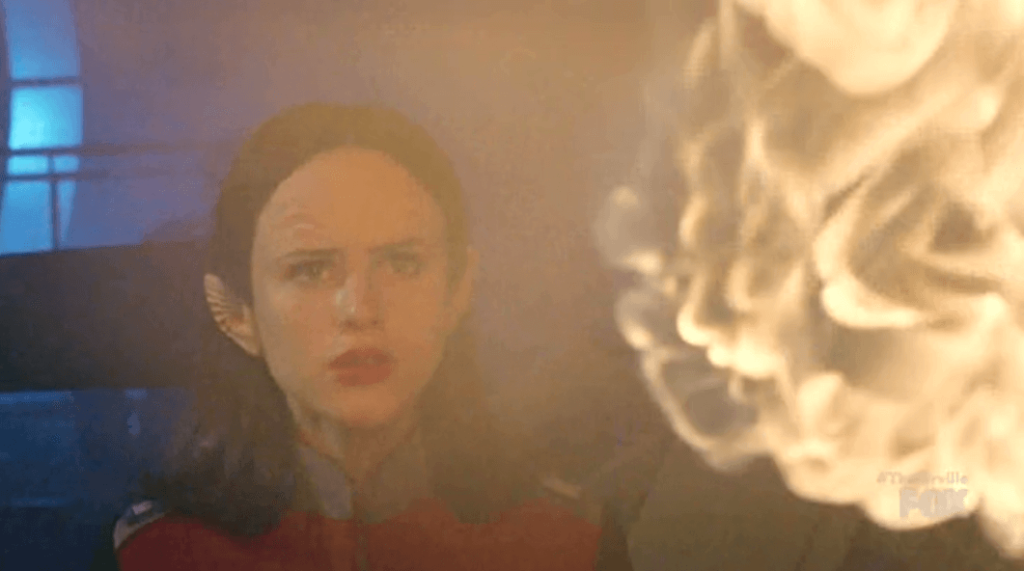
It’s not an auspicious beginning. There are a lot of positives and negatives to this episode, all of which line it up well with its intended clone source, Star Trek: The Next Generation; which often had the exact same problems with its clunkier episodes. For a first season entry, it is by no means inordinately ungainly, and it’s still miles ahead of the first episode, which could have killed the show at birth.
First, the good: Our characters joke around, but not at each others’ expense. That’s because they’re real friends, something of which the show has gradually convinced me by this episode. Despite what too many sitcoms that go past six years have told America, friends don’t really base their relationships on cynically one-upping each other. 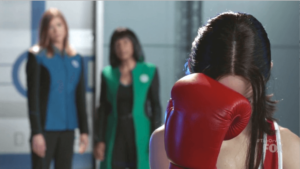 I’m glad this show gets that, and by this point in the season, I have already accepted the friendships as pretty genuine. In that very important way, The Orville’s first 12 episodes have surpassed TNG’s first season.
I’m glad this show gets that, and by this point in the season, I have already accepted the friendships as pretty genuine. In that very important way, The Orville’s first 12 episodes have surpassed TNG’s first season.
More of what fleshes these characters out comes from what the actors bring beyond their character descriptions. Bortus may be the best example of this; face covered with makeup appliances, and only able to stand at a completely stiff state of attention, but every line is said with conviction. If he’s supposed to be asking a question, he sounds curious. If he’s confirming information, there is always something behind it, suggesting he knows what the answer means to the listener. It’s just always there with him.
Another step up is the credibility the crew have with each other. Alara sees a clown, and they don’t take the easy humor options to bash her, or her experience. Time is not wasted with disbelief in her seeing the clown. That kind of question has to be earned, and this was a trap ST:TNG stepped into frequently. As many kooky things as they had already run into, if Counselor Troi said she saw a little boy who shouldn’t be there, her comrades exchanged carefully veiled, worried-about-her-sanity glances. Yes, that’s how people in general act when others see things, but it’s not how those people should have acted, not after what they’d seen, and not knowing their friend as they should.
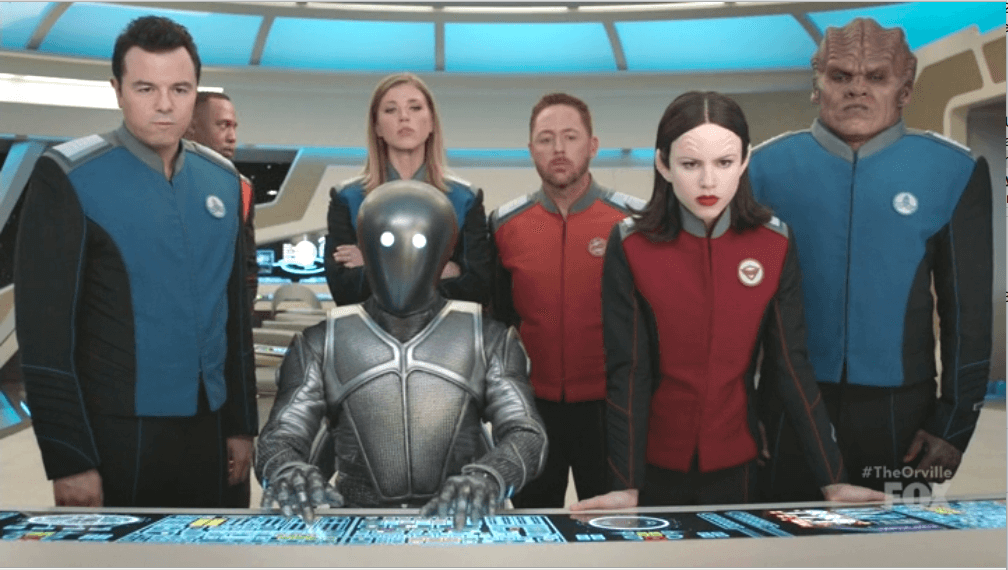
They also recognize, without bothering to say it out loud (because it’s so obvious, they know we’ll just get it) that since they’re all seeing the clowns and stuff, they are something other than mental delusions. People do not collectively hallucinate. Again—that’s just obvious. It lays waste to the notions that the historical post-resurrection appearances of Jesus of Nazareth were collective hallucinations among believers. Doesn’t happen. People claiming to be the smart people in the room shouldn’t be allowed to get away with suggesting that it does.
The positives generally fall into the area of how the episode feels to watch; and that’s a good thing, because plot-wise, it is embarrassingly derivative. That’s not a complete surprise coming from Seth MacFarlane, whose humorous output ranges from brilliant and incisive to merely replaying a well-known gag, whole cloth. This plot of episode is basically a type of the latter, a bare bones ‘face your fears’ message program:
- There is a fear
- I must face it
- Then I did FIN
It adds no detail to that formula. The episode’s music seems to be right out of Total Recall. 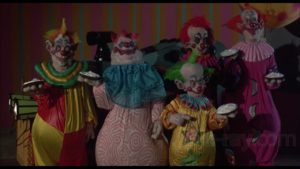 You couldn’t pick better music to copy than Goldsmith’s, but really, in an “am I dreaming or is this real” episode? And the clowns are full-on Chiodo Brothers clowns—Killer Klowns (from Outer Space, no less). The episode doesn’t quite clone, but does go well beyond merely evoking, the TNG episodes “Where No One Has Gone Before” and “Remember Me”.
You couldn’t pick better music to copy than Goldsmith’s, but really, in an “am I dreaming or is this real” episode? And the clowns are full-on Chiodo Brothers clowns—Killer Klowns (from Outer Space, no less). The episode doesn’t quite clone, but does go well beyond merely evoking, the TNG episodes “Where No One Has Gone Before” and “Remember Me”.
In a way, this has problems in the opposite areas of the film Star Trek: Insurrection. That thing is a mess, but if you try to describe the plot in one page, it actually sounds really cool. Where it fails is in the execution, all the elements that fall under the heading ‘film making’.
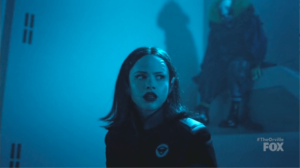 Firestorm is a hard episode to respect, because its failings are pretty glaring. Fortunately, the broad plot synopsis matters less than the area where its achievements lie, in the important areas, character, writing, execution overall. It aims to be spooky, and achieves that via the cinematography.
Firestorm is a hard episode to respect, because its failings are pretty glaring. Fortunately, the broad plot synopsis matters less than the area where its achievements lie, in the important areas, character, writing, execution overall. It aims to be spooky, and achieves that via the cinematography.
Because Macfarlane is rich, the effects, which need to look good to work, really do look good!
Overall, though, I can watch people pass through any lackluster plot if I believe the characters. I do here. I believe that they would all be there for Alara in just the ways they all are.
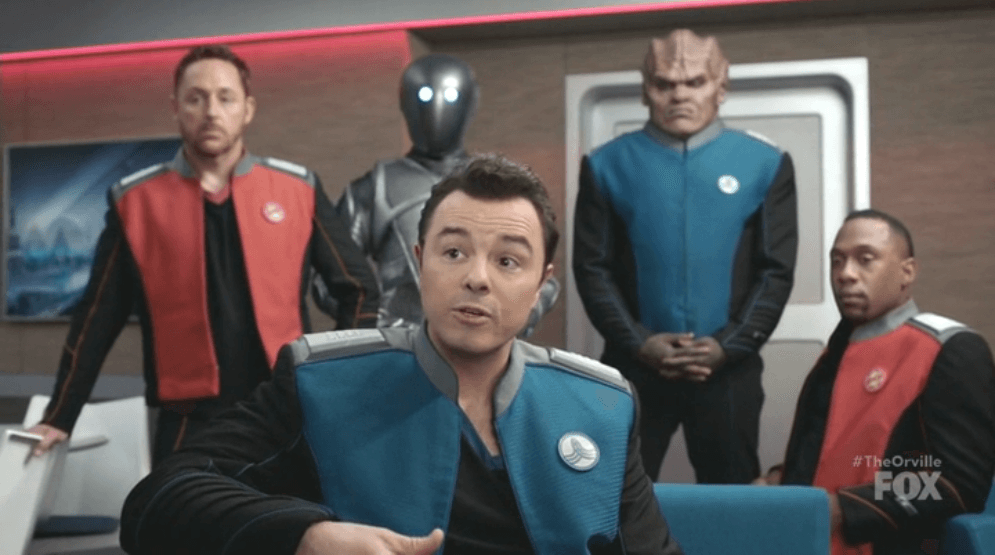
Firestorm is, at worst, enjoyable enough to fit into the middle of a binge.
• • •
Trektember is an annual series about Star Trek; this year, we’re examining the first seasons of Star Trek: Discovery and The Orville. For more information on this series, click here; or, to read every article from the beginning, click here!


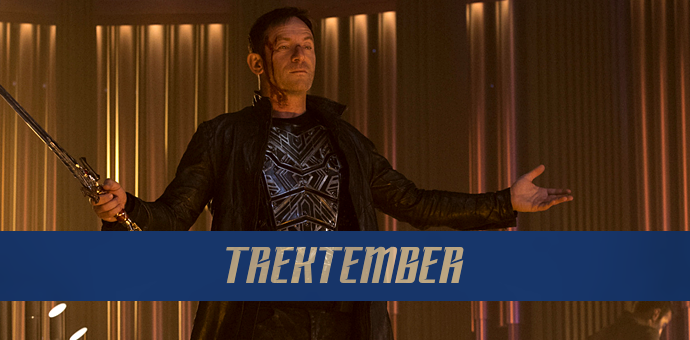
1 comment